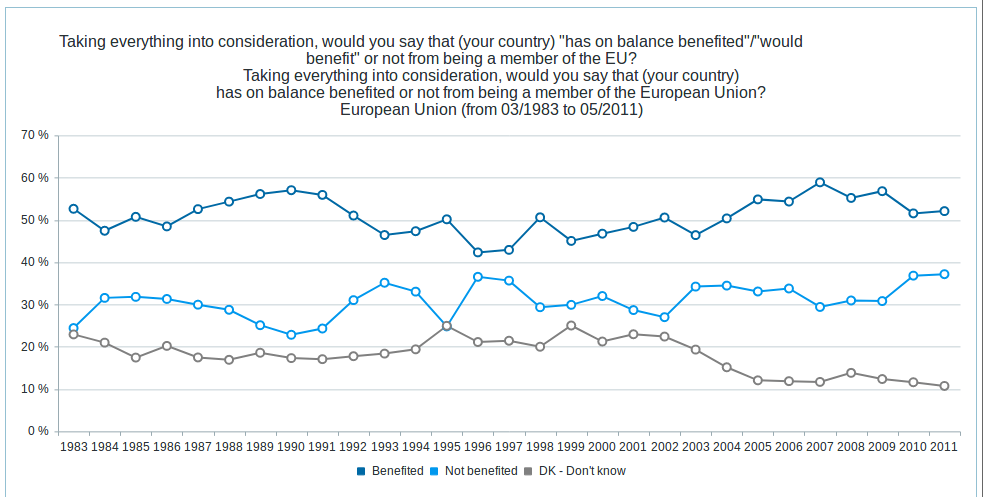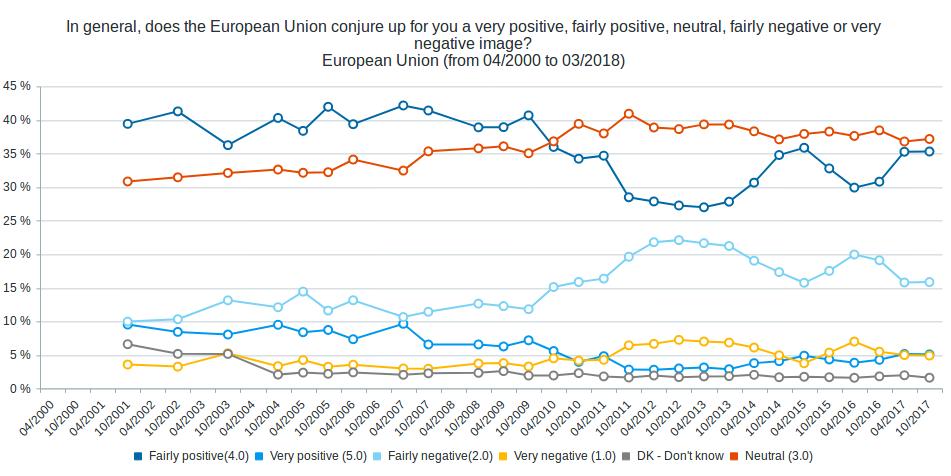It hasn't risen much (at least not EU-wide).
The Eurobarometer Interactive search system allows users to create line trends of answers to survey questions over time. One such question is:
Taking everything into consideration, would you say that (your country) "has on balance benefited"/"would benefit" or not from being a member of the EU?
Taking everything into consideration, would you say that (your country) has on balance benefited or not from being a member of the European Union?
European Union (from 03/1983 to 05/2011)

Source: Eurobarometer
These data unfortunately end in 2011, but for a different question, data do extend to the end of 2017:
In general, does the European Union conjure up for you a very positive, fairly positive, neutral, fairly negative, or very negative image?
European Union (from 04/2000 to 03/2018)
The data as visualised lack uncertainty bars, and to measure whether there is a statistically significant trend would take more work. However, at first glance, there does not appear to be a strong trend in "has your country benefited". The only partial trend that appears clearly visible, is the drop in the number of people who answer "Don't know" since 2000.
The "image" question does show that between 2009 and 2012, there was a decrease in "fairly positive" from around 40% to around 30%, trending back to 35% between 2012 and 2017. The trend for "fairly negative" is roughly opposite. There appears there may also be some increase in answers for "Neutral", but it would take more in-depth statistical modelling to calculate the significance.
One other recent data point, not from Eurobarometer, is a Dutch survey on Brexit and Nexit (=Dutch exit), which states that in 2016, 43% of surveyed people supported a Dutch exit, whereas in 2018, this had dropped to 30%. Among supporters of the Dutch Socialist Party (left-wing), support for exit dropped from 52% to 20%. Only among the populist right supporters is there still a (large) majority for Nexit. Support for populist (far) right (nationalist/conservative) eurosceptic parties overall in The Netherlands have been mostly constant (with many ups and downs) in the past 16 years (Pim Fortuyn, Geert Wilders, Thierry Baudet).
Some graphs for specific countries:
Sweden, a clear increase in support for the EU:
Greece, a clear decrease in support for the EU:
I would speculate that the Greek drop in support is due to the Greek government-debt crisis.
Hungary, a dip in 2012 (Eurozone debt crisis) and a smaller dip in 2015 (European migrant crisis), but clear recovery in positive feelings since then, back to pre-dip levels:
Conclusion: From available data, there does not appear to be much evidence for a large EU-wide trend in feelings about the EU, either pragmatically (whether it benefits the member state) or emotionally. Overall EU trends may mask trends in specific countries, and there may be other trends not visible in the data as presented either. The trends differ from country to country, and for those countries where there is a clear rise (such as Greece) the answers are likely specific to factors affecting that country.
Discussion: Clearly, there is a perception that euroscepticism has increased, more than it actually has. Where is this perception coming from? I would speculate (but have no evidence) that with the rise of populist right parties in some European (and non-European) countries in the past 20 years, eurosceptics in continental Europe have become more vocal (I believe they always have been vocal in England), people are more willing to speak their opinion when it is not aligned to the establishment. With the rise of such parties, eurosceptics have received a voice in national parliaments, and, more than before, in the mainstream media.



